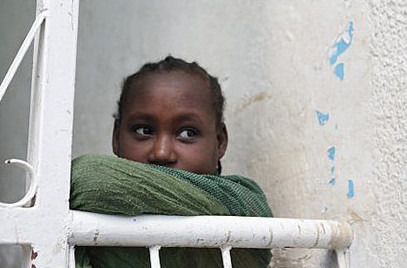She was shy, and that’s what drew aspiring photojournalist Shelby Wolfe to her. Her name was Rahel Nunu. Fourteen years old and hidden beneath a green scarf and brown skirt, she lived in a compound in Addis Ababa for Ethiopian children turned into orphans by the AIDS pandemic. Living HIV positive in a country where the disease is so stigmatized had taught Rahel the value of discretion. It was May, the hottest month in the Horn of Africa, but she insisted on covering her arms with the scarf: her skin had erupted with rashes and sores, side effects of the powerful antiviral medications she took. Today she’d also skipped school, not wanting to take the risk of her condition being scrutinized by her classmates, who didn’t know her secret.
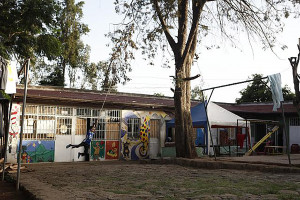
Shelby, a college freshman from small-town Minnesota, was visiting the compound as part of a photojournalism fellowship. She gravitated toward Rahel the moment she met her. The quietest girl in the orphanage, Rahel was an observer when alone or in groups, keeping her distance from the other children as they crowded around the compound’s TV to watch soccer matches and American music videos. Shelby was quiet herself, and she could relate to Rahel.
Sitting down next to Rahel, Shelby pulled out two sketchbooks and a pile of pencils she’d bought on the street. Shelby knew Rahel could draw. She had recently done well in a local art competition. With pencils or crayons or paint, she would draw the other girls—her sisters, as they called each other—or the beautiful women she saw on TV.
Shelby hoped the sketchbooks might get her to start talking about herself. Without speaking, Rahel drew a mother with the willowy look of a model.
Shelby drew an elephant. “Does my elephant need anything else?” Shelby asked.
Rahel took the sketchbook and added a baby elephant next to Shelby’s elephant, making it a mother.
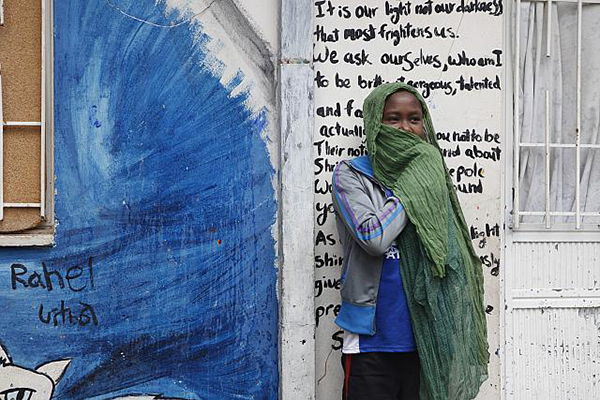
Shelby was one of ten students from the University of Nebraska who were visiting Ethiopia on a three-week fellowship. For the past few years, donors had covered the overseas travel costs for a group of the university’s student photojournalists and videographers and a few of their professors (disclosure: I was one of the professors on Shelby’s trip). There were two conditions. First was that the students use the opportunity to capture Ethiopia’s stories of poverty and help bring about change there. Second was that they show their fellow Americans a new Ethiopia, a different kind of country than the one that Sally Struthers and company had brought to public attention in the 1980s with horrifying television images of famine victims.
Shelby had just twenty-one days to finish her assignment: shoot a batch of photos and videos that would impress her professors and wind up in a documentary and related blog the class was making about poverty in Ethiopia. Shelby needed a subject, and Rahel was the girl she chose. But Shelby didn’t have the reporting experience to get Rahel to open up to her. Shelby’s past work at her college newspaper was something altogether different from documenting a life-and-death issue like HIV/AIDS in Africa—and truth be told, Shelby had struggled to pass her reporting class that spring, right before she left for Ethiopia. She had never done anything like this before.
And then there was the heartbreak of the orphanage. She saw kids curled up on bunks, clutching their stomachs; the toxic medication they took seemed to make them as sick as the disease it was meant to fight. She saw babies, too, sleeping in rows of cribs, as nurses shuttled about the room caring for them. (“They’re our children,” one nurse told her.) For Shelby, the wild swings in emotion were difficult to take. One moment, she was watching kids playing ping-pong and twirling on a tire swing in front of walls painted with Dora the Explorer and Dr. Seuss characters—one of them drawn by Rahel. Another moment, Shelby found herself in the dark office of the orphanage’s assistant director, listening to Addis Bogale’s sobs as she described the most recent death of a child. “You don’t forget them,” Bogale said.
Shelby was overwhelmed by it all. She worried about whether she could handle three weeks in such grim surroundings. And yet she also knew that Rahel, and all her orphan brothers and sisters, didn’t get to leave.
Shelby slid the sketchbooks over to Rahel.
“You can keep those,” Shelby said.
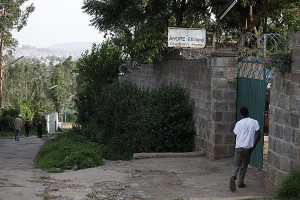
Shelby Wolfe grew up in Minnesota. Her hometown, Owatonna, population 25,000, is the kind of heartland community that urges citizens on its Facebook page to make flag-themed fruit dips—strawberries, bananas, and blueberries—for the Fourth of July holiday. Her family lived an hour’s drive away from the Mall of America, one of the world’s largest shopping centers. As a kid, Shelby danced at an upscale studio. She had the same boyfriend for three years in high school. But she also loved Vietnamese food, especially a dish of grilled pork over vermicelli, and liked going to shows at First Avenue, a music venue where Prince used to play. Inspired by her globe-trotting older sister, she had hiked the Rocky Mountains and backpacked through Germany.
Shelby went off to college at the University of Nebraska. Away from home, Shelby pierced her nose. She started hanging out in coffeeshops. She became obsessed with her photojournalism class, to the point her other grades dropped and she had to do some explaining to her parents.
But that passion for photography also brought her to Ethiopia. The orphanage is funded by AHOPE for Children, a nonprofit based in Virginia. On her first day there, Shelby and her professor met with assistant director Bogale, who walked them through the part of the compound for younger children and then to a nearby group home. Bogale’s creation, the group home was a new project to integrate the children into the community so that AHOPE could get rid of the orphanage altogether. But that dream was a generation in the making.
Then Bogale brought them to another part of the compound, where Shelby met the teenage orphans. Sitting alone in one corner, watching the other girls watch music videos on the TV, was Rahel.
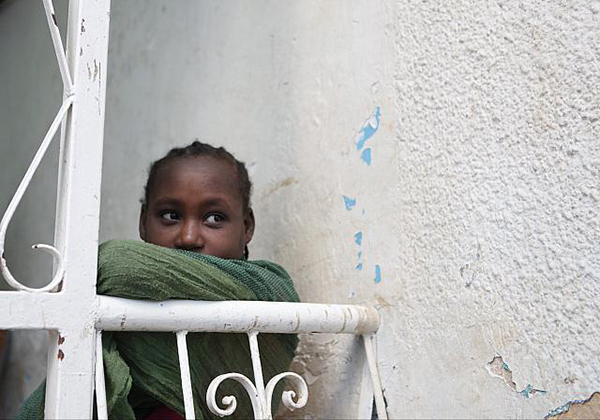
Addis Ababa is a modern city, only a century old. The capital of Ethiopia, it houses the headquarters of the African Union and is also known for being the home of beloved twentieth-century emperor Haile Selassie, known as Ras Tafari, who became the muse for the reggae movement half a world away.
Shelby saw little of the city. She spent each day at the compound. Nights, she met up with the other nine student photographers and three instructors, and together they critiqued the day’s photos. Those sessions were often as stressful for Shelby and her fellow students as the orphanage itself.
The group looked over the photos on Shelby’s laptop of Rahel sitting on her bed, watching TV, and showing off her artwork. It was clear to everyone that Shelby had some good shots, but she didn’t have a story.
Shelby was growing anxious. She didn’t have many days left. Her professors told her to keep shooting photos. Keep changing perspective. Keep asking questions. Shelby threw herself into the work, getting absorbed by the technical aspects of her craft. She kept telling herself that the story wasn’t about her. She should quit focusing on her own fears. What were they compared to Rahel’s? This girl wasn’t with her family—though she had one out there somewhere, unlike many of the girls in the compound. Not even the teachers at her school knew about her HIV. Being an orphan was enough of a stigma; she didn’t need the kids to know the rest.
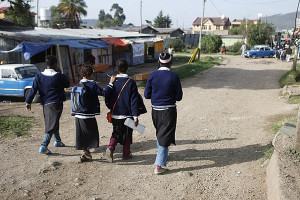
One morning, Shelby followed Rahel to her school, where the staff put Shelby in front of all the kids and gave her a microphone to explain who she was and why she was there. The students lined up to meet her one by one. Then they lined up again to give her pink, orange, and white flowers. “Miss, I love you,” one girl said to her with a smile. The students giggled and begged Shelby to take their photos.
No, she could not fail at this.
One day at the orphanage, Shelby sat on the ground while Rahel rocked in a swing. Names of the world’s cities, countries, and landmarks were written in chalk on the walls of the compound. Rahel asked Shelby about the Coliseum in Rome. Shelby’s sister had been to India, and Rahel asked about how beautiful the country was. Rahel said she’d seen New York in a movie and wanted to see it for real.
Shelby asked her if she knew anyone who had visited other countries. Rahel said some of the other children had been adopted by families in the United States.
“Does that make you sad?” Shelby asked.
“Yes, but other children come.”
Rahel had been in the orphanage since she was five. Every child there, she told Shelby, was part of her family. “All I know is here,” she said.

“I realized this is their life and these kids are making the best of it,” Shelby told me later. “I couldn’t imagine not having a family. But at the same time it was really touching that they are each other’s family.”
Her time with Rahel made Shelby think about how fortunate she was. Shelby is close to her older sister, who is always up for going with her to concerts and hikes and bonfires. She has a dad who is a periodontist and a mom who works at a pharmacy, and they lovingly take care of all her needs—from the Ford Focus she drives, to her out-of-state college tuition, to all the dance costumes in her closet.
Rahel had none of that. She could only rely on her “family” at the compound—assuming her sister-friends didn’t leave for a home of their own. When she prayed, Rahel said, she prayed for everyone at the orphanage. She prayed for the many mentally ill among the city’s street people.
“What do you pray for yourself?” Shelby asked.
Rahel said she’d ask God to help her help others. She’d ask to go to a better place, somewhere with a family that would make her their own. God can do anything, she said.
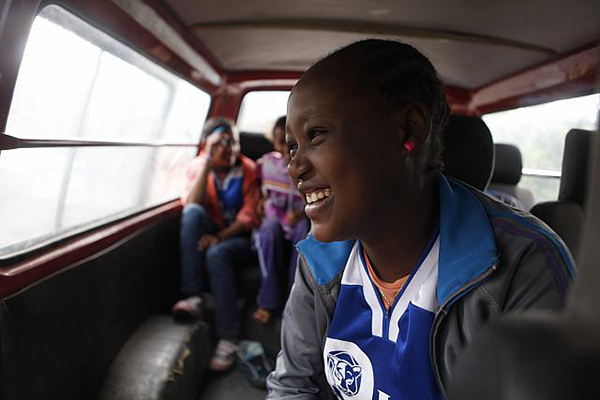
Near the end of Shelby’s time in Ethiopia, Rahel and her classmates went on a trip. AHOPE and some of the other local orphanages had organized a soccer tournament, and the girls were set to play matches against the other orphanage teams—some with HIV and non-HIV kids, some with no HIV kids. As they rode to the soccer field in a red passenger van, the girls were noticeably giddy, happy to leave the compound for something other than school. In her field notes, Shelby described what happened next:
The girl sitting next to Rahel began vomiting into a narrow crevice between her seat and the doorway. The laughter and singing stopped, replaced with the sound of violent heaving.
Rahel placed her hand on her sister’s back, but her eyes were peeled forward, and her smile was gone. She handed the girl a tissue to wipe her mouth. The girl was embarrassed and turned to Rahel to say thank you. Rahel smiled slightly at her and withdrew her hand, collapsing it into her lap like it was too heavy for her to hold up on her own.
The van ride was silent for the rest of the way to the soccer fields, where they would face hundreds of other children who do not know they are HIV positive. It was as if they had forgotten, and then been reminded, of the burden they hold trying to hide their status from the world.
When they arrived at the sports complex, the girls put on their best game-faces and stepped out of the van one by one. They stuck together as they walked slowly toward the fields of children already playing.
The photos that day were strong. The van ride. The soccer match. The sidelines. The kids played games, and clapped and sang together. But most striking was an image of shy Rahel, having forgotten momentarily about the camera, dancing with her sister-friends in front of Shelby.
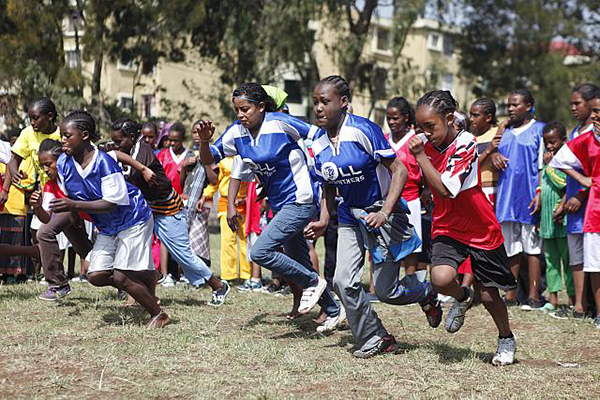
The fellowship ended, and Shelby completed her assignment. Her professors were pleased. But in her field notes, Shelby was ambivalent. My work and being there for the last two-plus weeks was insignificant and maybe even selfish, she wrote.
When Shelby met Rahel before leaving through the front gate for the last time, she teared up and said, “I’ll see you later, Rahel.” But that wasn’t true.
Rahel said goodbye and waved hesitantly, with a solemn look on her face.
Then Shelby went home.
Scott Winter is an assistant professor at the University of Nebraska-Lincoln. Shelby Wolfe is a sophomore photojournalism student at the University of Nebraska, where she is a senior photographer at the Daily Nebraskan. In November her project on Rahel will be released in a seven-minute multimedia video. Twitter: @UNL_scottwinter
- Follow us on Twitter: @inthefray
- Comment on stories or like us on Facebook
- Subscribe to our free email newsletter
- Send us your writing, photography, or artwork
- Republish our Creative Commons-licensed content

